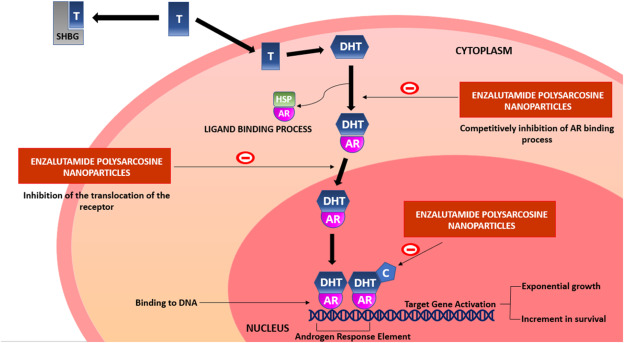d-α-tocopheryl polyethylene glycol 1000 succinate surface scaffold polysarcosine based polymeric nanoparticles of enzalutamide for the treatment of colorectal cancer: In vitro, in vivo characterizations

Field emission scanning electron microscopy and transmission electron microscope images revealed nanosized, spherical polymeric nanoparticles (NPs) with a size distribution ranging from 178.9 ± 2.3 to 212.8 ± 0.7 nm, a zeta potential of 12.6 ± 0.8 mV, and entrapment efficiency of 71.2 ± 0.7 %. The latter increased with higher polymer concentration. Increased polymer concentration and homogenization speed also enhanced drug entrapment efficiency. In vitro drug release was 85 ± 22.5 %, following the Higuchi model (R2 = 0.98) and Fickian diffusion (n < 0.5).
Highlights
- Enzalutamide (ENZ) scaffolded PLGA-polysarcosine (PSAR) nanoparticles were fabricated with outer coating of TPGS for solubility enhancement.
- ENZ-PLGA-PSAR-TPGS NPs characterized by SEM, TEM, DSC, XRD, FT-IR.
- In vitro anti-cancer cyto-toxicity evaluation performed for ENZ-PLGA-PSAR-TPGS NPs in HCT-116 cell lines.
- Haemolysis, Platelet aggregation, Acute toxicity conducted to analyze biocompatibility.
- Anti-Cancer activity of ENZ-PLGA-PSAR-TPGS NPs evaluated by Apoptosis, MMP, ROS, wound healing, DNA fragmentation studies.
In vitro cytotoxicity assessments, including Mitochondrial Membrane Potential Estimation, Apoptosis analysis, cell cycle analysis, Reactive oxygen species estimation, Wound healing assay, DNA fragmentation assay, and IC50 evaluation with Sulforhodamine B assay, indicated low toxicity and high efficacy of polymeric nanoparticles compared to the drug alone. In vivo studies demonstrated biocompatibility and target specificity. The findings suggest that TPGS surface-scaffolded polysarcosine-based polymer nanoparticles of ENZ could be a promising and safe delivery system with sustained release for colorectal cancer treatment, yielding improved therapeutic outcomes.
Download the full article as PDF here: d-α-tocopheryl polyethylene glycol 1000 succinate surface scaffold polysarcosine based polymeric nanoparticles of enzalutamide for the treatment of colorectal cancer: In vitro, in vivo characterizations
or read it here
Materials
Enzalutamide was obtained as a gift sample from BDR Lifesciences Private Limited, Gujarat, India. The PLGA polymer (50/50) with an inherent viscosity of 0.95–1.20 dl/g was purchased from Nomisma Healthcare Private Limited, Gujarat, India. PSAR (Molecular weight: 89.09 g/mol; Melting point: 208–212 °C) was procured from Sigma-Aldrich Limited, Bengaluru, India. TPGS was sourced from Thermo Fisher Scientific India Private Limited, Mumbai, India. Methanol was purchased from Merck Limited, Mumbai, while acetone, Tween 80, and diethyl ether were obtained from Rankem, Mumbai. PVA was acquired from Research Lab, Mumbai. Dialysis tubing cellulose membranes (1 Dia 8/32, 6.3 mm; 12400Da) were purchased from Himedia company, India.
Disha Shah, Sankha Bhattacharya, Girdhari Lal Gupta, Ketan Hatware, Arinjay Jain, Laxmi Manthalkar, Niraj Phatak, Putrevu Sreelaya, d-α-tocopheryl polyethylene glycol 1000 succinate surface scaffold polysarcosine based polymeric nanoparticles of enzalutamide for the treatment of colorectal cancer: In vitro, in vivo characterizations, RESEARCH ARTICLE| VOLUME 10, ISSUE 3, E25172, FEBRUARY 15, 2024, Published:February 02, 2024DOI:https://doi.org/10.1016/j.heliyon.2024.e25172
Read more on TPGS here and watch also the interesting video on Vitamin E TPGS:

